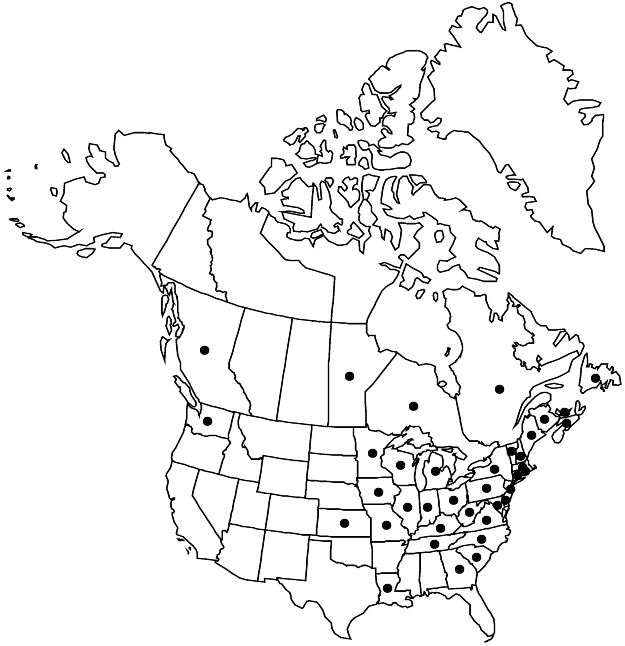Hylotelephium telephium
Bot. Mag. (Tokyo) 90: 53. 1977 ,.
Stems 2–9 dm × 2–10 mm, from short rootstock with cluster of white, tuberous, carrotlike roots, sometimes with axillary buds that fall and take root. Leaves alternate on large stems, sometimes opposite on axillary shoots, sessile, becoming markedly smaller distally; blade dull green, often glaucous, elliptic-oblong, 4–10 × 1–4 cm, base rounded or in distal leaves cuneate, margins coarsely dentate, apex acute to obtuse. Cymes dense, 5–20 cm diam. Pedicels ca. 2 mm. Flowers often sterile, 5–11 mm diam.; sepals lanceolate, 2–3 mm; petals purple or purplish red, 5–8 mm; stamens usually 10, nearly as long as petals; pistils 5, pink, 3–5 mm; styles 1 mm; nectaries yellow, oblong, 0.6 mm, longer than wide. 2n = 36.
Phenology: Flowering summer.
Habitat: Roadsides, old fields, clearings, waste places
Elevation: 0-600 m
Distribution

Introduced; B.C., Man., N.B., Nfld. and Labr. (Nfld.), N.S., Ont., P.E.I., Que., Conn., Del., Ga., Ill., Ind., Iowa, Kans., Ky., La., Maine, Md., Mass., Mich., Minn., Mo., N.H., N.J., N.Y., N.C., Ohio, Pa., R.I., S.C., Tenn., Vt., Va., Wash., W.Va., Wis., n Eurasia.
Discussion
For central Europe, H. ’t Hart (1985b) regarded all forms within this morphologically and cytologically variable complex as expressions of a single variable species. R. T. Clausen (1975) noted that the fertile diploid he called Sedum fabaria may be a rare introduction in North America; he used the name S. purpureum for the widely naturalized form. He found remarkably little variation, most plants looking like parts of one clone. He considered this a sterile triploid that reproduces only vegetatively, adding that it is a long-day plant and does not even flower in the southern part of its naturalized range. H. A. Allard (1940) and H. ’t Hart and J. van Arkel (1985) found that it would flower with artificially lengthened days. Clausen wrote that stems growing early in the season have alternate leaves but that those growing later or from axillary buds after injury may have opposite leaves.
According to M. L. Fernald et al. (1958), young stems and leaves are delicious in salads and older ones used as a potherb are “of indifferent quality,” and the crisp and succulent roots, pickled in salted vinegar, make a tasty relish.